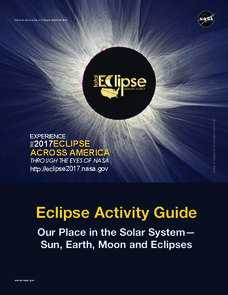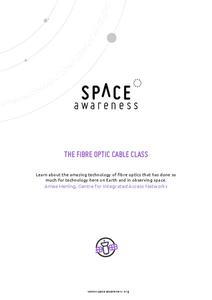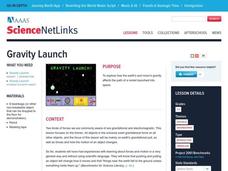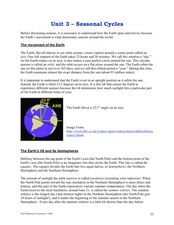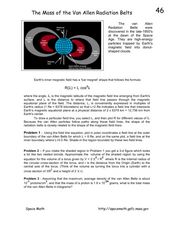NASA
Eclipse Activity Guide
Ever made solar s'mores? Or recreated the solar system using peanuts? Astronomers young and old investigate all things solar using a variety of activities. Explore how the sun works, types of light it emits, and methods of charting the...
Space Awareness
Valleys Deep and Mountains High
Sometimes the best view is from the farthest distance. Satellite imaging makes it possible to create altitude maps from far above the earth. A three-part activity has your young scientists play the role of the satellite and then use...
Space Awareness
The Big Meltdown
Explore the world (our world) of melting ice caps. Why are these caps melting? What is the effect of melting ice caps? Dive into the ever-present issue of global warming with a resource that has learners looking at data and participating...
Space Awareness
Oceans on the Rise
Temperature rises and land disappears! Through a lab exploration, learners understand the effect of temperature increase on water similar to the effect of global warming on our oceans. As they heat the water in a flask, they measure the...
Space Awareness
The Fibre Optic Cable Class
Many people know that fiber optics are used in delivering the Internet, but are surprised to learn they are also used in astronomy. Scholars explore light, reflection, and fiber optics through hands-on activities. They discuss...
Space Awareness
Coma Cluster of Galaxies
Scientists classify everything from the smallest cells to the largest galaxies, but how do they decide on a classification system? Scholars use 40 pictures of galaxies taken by the Hubble Space Telescope to sort and try creating their...
American Museum of Natural History
The Amazing Mundo
Rocks and minerals are great on their own, but they also turn into some pretty amazing stuff! An online lesson explains the different types of materials we get from rocks and minerals, including glass, plastic, and coins. An embedded...
EduGAINs
Go H2O! Investigating Residential Water Systems
Before your learners excuse themselves to get a drink at the water fountain, prompt them to think about where that water comes from. A middle school science lesson encourages groups to research their community's source of drinking water,...
Alabama Learning Exchange
The Big Bang Theory: An Evidence-Based Argument
What evidence supports the big bang theory? Individuals analyze scholarly resources about the the theory and develop arguments backed by evidence. They brainstorm, share ideas, watch a video, and read articles to complete a graphic...
Teach Engineering
Protecting Our City with Levees
Teams use the design process to design, build, and test a model levee to protect the town from a wall of water. A handout provides a price list for the materials learners can use to build their levee within a budget.
NASA
Supernova Chemistry
By measuring the wavelength, frequency, and intensity of electromagnetic radiation, scientists determine the temperature, density, and composition of far away items. Scholars rotate through ten lab stations using a spectroscope at each...
Curated OER
The Water Planet
Students use NASA photographs and hands-on activities to compare the amounts of land and water on our planet. They discover that the world has five oceans and that they cover seventy percent of Earth's surface. Students learn how this...
Curated OER
Coronal Mass Ejections
For this coronal mass ejections worksheet, students observe a time line of events that took place during a solar storm. Students use the time line to answer 3 questions about the solar storm and the time it took to reach Earth. Students...
Curated OER
Gravity Launch
Students examine how gravity affects launching rockets into space. In this physical science lesson, students review the concept of gravity and use an interactive online site, "Gravity Launch," to simulate a rocket launch.
Alabama Learning Exchange
Learning the Three Layers
Students examine the Earth's crust or lithosphere, mantle and core. They complete research using assigned web sites before designing a model of the Earth using items such as Play-Doh, peaches and apples.
Curated OER
Seeing a Dwarf Planet Clearly: Pluto
In this dwarf planet worksheet, students use images from the Hubble Space Telescope and they determine the scale of the image, they identify the largest features in the images, they calculate the volume of Pluto and they create a model...
Curated OER
Seasonal cycles
Students understand that the rotation of the Earth is responsible for the seasons. In this seasonal cycles lesson, students learn how the rotation of the Earth affects the seasons. Students answer questions about the rotation, the...
Curated OER
Variables and Expressions from Around the Cosmos
In this variables and expressions worksheet, students solve 7 problems using different mathematical formulae to find the length of Earth's day in the future, the distance to the galaxy Andromeda, the temperature of a gas cloud emitting...
Curated OER
It's A Meteor
Learners complete a webquest to find Earth's relationship to the sun. In this webquest lesson, students complete tasks to understand the effect of the sun on weather and time. Learners create a multimedia presentation as an...
Curated OER
The Relative Sizes of The Sun and Stars
In this relative sizes of the sun and stars worksheet, students determine the relative sizes of the Earth, Jupiter, the Sun and other stars. Students compare the size of stars given ratios of one star to another.
Curated OER
Our Sky Clock
Students explore space science by completing a worksheet in class. In this astronomy instructional activity, students discuss and identify star patterns in the night sky and relate these patterns to the approximate time they appear....
Curated OER
The Mass of the Van Allen Radiation Belts
In this van Allen Radiation Belts worksheet, students are given the formula for the field line of the Earth's inner magnetic field. Students use this equation to find the polar coordinates of a field line in the van Allen Belts. They...
Curated OER
A Trip to St. Michael's
In this earth science worksheet, students read a 5 journal entries and illustrate how the places look based on the journal description.
Curated OER
Solar System Search
Students research topics related to space and the planets using the Internet. They explore various websites, construct scale models of the solar system, and create a travel brochure using HyperStudio computer software.
